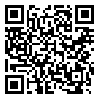BibTeX | RIS | EndNote | Medlars | ProCite | Reference Manager | RefWorks
Send citation to:
URL: http://mjiri.iums.ac.ir/article-1-2334-en.html
Background: Type 2 diabetic mellitus patients are amongst the most susceptible groups to vascular abnormalities, which predominantly lead to myocardial disease. The hypercoagulable state has been widely studied by researchers as being the major suspicious mechanism facilitating the consecutive chain of molecular events leading to these complications. However, there is no consensus on the definition of the hypercoagulable state with respect to coagulation quantities, their interrelations and basic factor(s) initiating this pathogenic event, by which the prognosis of myocardial complications could be determined.
Methods: Path analysis was used to study the interactions between coagulation factors as well as other factors beyond coagulation factors in relation with pathogenic events in both diabetics and healthy subjects. In the present work, coagulation factors of 40 healthy and 40 type 2 diabetics were determined experimentally. The data were then analyzed using SPSS and AMOS software. Multivariate regression analysis was done to draw path diagrams.
Results: Our results show that FII, as the main cause for hypercoagulable state, is directly induced by FX and FVIII in normal individuals and by FX, FXI, FV and VWF cofactors in diabetic patients.
Conclusion: In general, our findings showed complicated relationship between coagulation factors and their effects either separately or combined.
| Rights and permissions | |
 |
This work is licensed under a Creative Commons Attribution-NonCommercial 4.0 International License. |





